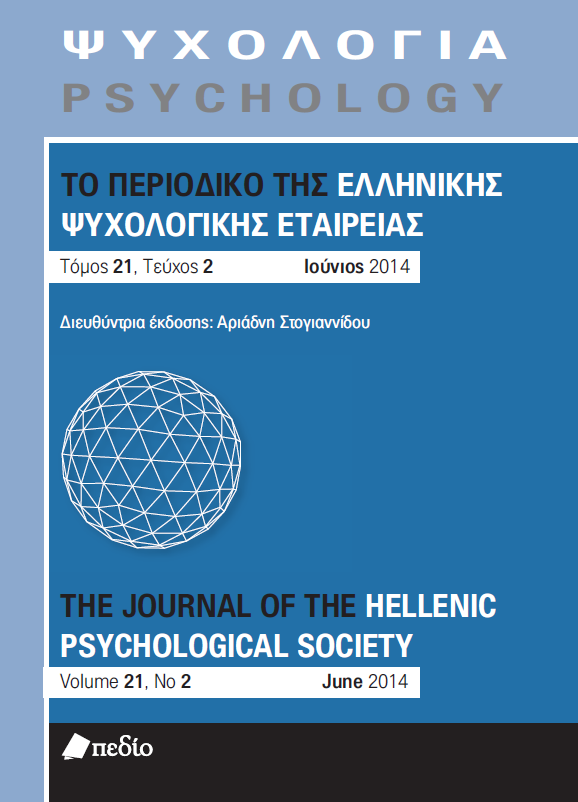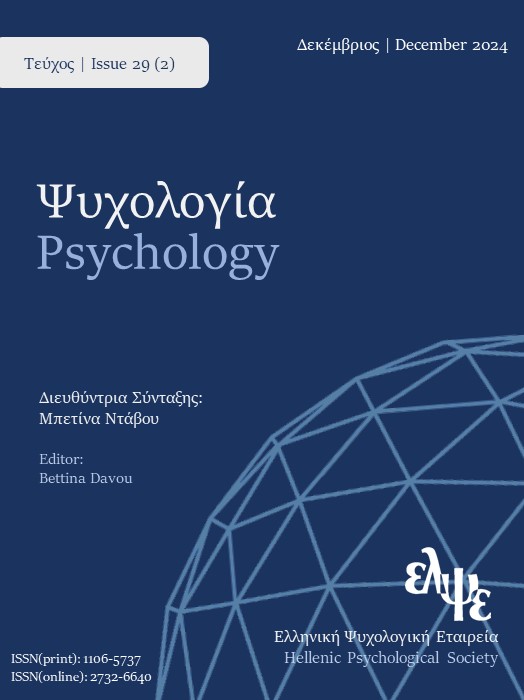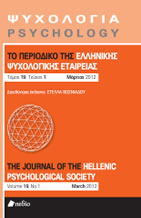Ποιοτική διερεύνηση της βιωμένης εμπειρίας της ψύχωσης: Μεθοδολογική ανασκόπηση

Περίληψη
Στην εργασία αυτή επιχειρείται μια μεθοδολογική ανασκόπηση ποιοτικών μελετών της βιωμένης εμπειρίας της ψύχωσης. Στόχος είναι η παρουσίαση των κεντρικών ερευνητικών ρευμάτων της ψυχωτικής εμπειρίας και η αποτίμηση της χρησιμότητας και καταλληλότητάς τους για τη μελέτη του ρόλου των κοινωνικών παραγόντων στην εμφάνιση, βίωση και διαχείριση της ψύχωσης. Στην εργασία παρουσιάζονται: (α) η φαινομενολογική προσέγγιση, που στοχεύει στον προσδιορισμό της ουσίας της ψυχωτικής εμπειρίας, (β) η αφηγηματική και διαλογική προσέγγιση, που επικεντρώνονται στη συγκρότηση του εαυτού στην ψύχωση, μέσω της εξέτασης των χαρακτηριστικών των αφηγήσεων του εαυτού, (γ) η κοινωνική κονστρουξιονιστική προσέγγιση, που μέσω της ανάλυσης του λόγου ατόμων με εμπειρία ψυχικού πόνου εξετάζει την κοινωνική κατασκευή του ψυχικού πόνου, και τέλος (δ) εμπειρικές μελέτες που χρησιμοποιούν θεματικού τύπου ποιοτική ανάλυση συνεντεύξεων με άτομα με εμπειρία ψυχικού πόνου, προκειμένου να αναδείξουν τις εμπειρίες, απόψεις και θέσεις των ατόμων αυτών σχετικά με ποικίλες πτυχές της ζωής με την ψύχωση. Σε καθεμία από τις προσεγγίσεις εξετάζονται: (α) το επιστημολογικό παράδειγμα που υιοθετείται (β) η θεώρηση της ψύχωσης, και του ψυχικού πόνου εν γένει, (γ) η ερευνητική μεθολογία που ακολουθείται, αναφορικά με τη συλλογή και την ανάλυση του ερευνητικού υλικού, (δ) τα κεντρικά ευρήματα και συμπεράσματα των μελετών, και (ε) ο ρόλος που η κάθε προσέγγιση αποδίδει στις κοινωνικές παραμέτρους και διεργασίες.
Λεπτομέρειες άρθρου
- Πώς να δημιουργήσετε Αναφορές
-
Γεωργάκα Ε. (2020). Ποιοτική διερεύνηση της βιωμένης εμπειρίας της ψύχωσης: Μεθοδολογική ανασκόπηση. Ψυχολογία: το περιοδικό της Ελληνικής Ψυχολογικής Εταιρείας, 20(4), 397–412. https://doi.org/10.12681/psy_hps.23599
- Τεύχος
- Τόμ. 20 Αρ. 4 (2013)
- Ενότητα
- ΑΝΑΣΚΟΠΗΣΕΙΣ

Αυτή η εργασία είναι αδειοδοτημένη υπό το Creative Commons Attribution-ShareAlike 4.0 International License.
Το περιοδικό ΨΥΧΟΛΟΓΙΑ έχει υιοθετήσει μία πολιτική Platinum open-access. Τα έξοδα υποβολής, επεξεργασίας ή δημοσίευσης των εργασιών καλύπτονται από την Ελληνική Ψυχολογική Εταιρεία. Τα πνευματικά δικαιώματα των δημοσιευμένων εργασιών προστατεύονται από την άδεια 'Creative Commons Attribution-ShareAlike 4.0 International'. Οι Συγγραφείς διατηρούν τα Πνευματικά Δικαιώματα και χορηγούν στο περιοδικό το δικαίωμα της πρώτης δημοσίευσης. Η άδεια αυτή επιτρέπει σε τρίτους, να χρησιμοποιούν την εργασία σε οποιαδήποτε μορφή, με την προϋπόθεση της διατήρησης των διατυπώσεων που προβλέπονται στην άδεια σχετικά με την αναφορά στον αρχικό δημιουργό και την αρχική δημοσίευση στο περιοδικό ΨΥΧΟΛΟΓΙΑ. Επιπλέον, κάθε διανομή της εργασίας οφείλει να γίνεται με τους ίδιους όρους διανομής, δηλαδή με την ίδια άδεια Creative Commons.







